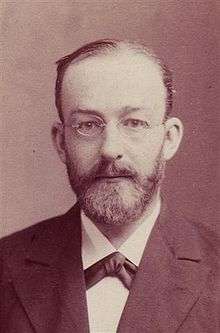Eberhard Nestle
Eberhard Nestle (May 1, 1851, Stuttgart – March 9, 1913, Stuttgart) was a German biblical scholar, textual critic, orientalist, editor of the Novum Testamentum Graece, and the father of Erwin Nestle.

Life
Nestle was a son of the upper tribunal procurator (Obertribunalprokurator) Christian Gottlieb Nestle and his wife Sophie Beate Kleinmann. His half-brother from his father's second marriage was classical philologist Wilhelm Nestle.
Nestle studied at the University of Tübingen – the Tübinger Stift – from 1869 to 1874. His studies culminated in his doctoral thesis on the Hebrew and Greek text forms of the Book of Ezekiel. Afterwards he worked in the area of orientalism and wrote, among other things, a Syriac grammar. During his later years, his focus changed to textual criticism of the New Testament.[1]
Between 1898 and 1912 he worked as professor at the Evangelical Seminaries of Maulbronn and Blaubeuren.[1]
In 1880, he married Klara Kommerell (1852–87) in Tübingen; they had one son, Erwin Nestle. In 1887 his wife died after a short illness, and three years later, in 1890, Nestle married Elisabeth Aichele (1867–1944). In this second marriage, five daughters and one son were born.
In 1898 Nestle published a handbook of textual criticism, and in 1898 published the first edition of a Greek New Testament under the title Novum Testamentum Graece cum apparatu critico ex editionibus et libris manu scriptis collecto. The text of this Greek New Testament was combined with the editions of Constantin von Tischendorf (Editio octava critica maior), The New Testament in the Original Greek of Westcott and Hort, and the edition of Richard Francis Weymouth. It was edited by the Württemberg Bible Society in Stuttgart. This edition eliminated the extremes of Tischendorf, such as partiality to Sinaiticus, and of Westcott and Hort, such as partiality to Vaticanus.[2]
This edition was adopted by the British and Foreign Bible Society, replacing the Textus Receptus. After a few years this edition received worldwide recognition as the best edition of the Greek New Testament. This edition took the place which formerly belonged to the Textus Receptus and became a "New Textus Receptus".
After the death of Eberhard Nestle his son Erwin Nestle (1883–1972) took over the publication and contributed substantially to a constant improvement of the editions.[3] Since 1952 the edition occurred with the cooperation of Kurt Aland (21st edition).[2] The theological standard work "Nestle-Aland" appeared from 1993 in the 27th edition.
Works
- Psalterium tetraglottum graece, syriace, chaldaice et latine (1879);
- Syrische grammatik mit litteratur, chrestomathie und glossar (1888);
- Veteris Testamenti graeci codices Vaticanus et Sinaiticus cum texto recepto collati, 1880, 2. Aufl. (1887);
- Marginalien und Materialen (1893)
- A Palestinian Syriac Lectionary containing lessons from the Pentateuch, Job, Proverbs, Prophets, Acts, and Epistles (1897);
- Vom Textus Receptus des griechischen neuen Testaments: Ein erweiterter Vortrag (1903)
- Einführung in das griechische Neue Testament, 3. Aufl. (Göttingen: 1909).
References
- Bautz, Traugott, ed. (1993). "Eberhard Nestle". Biographisch-Bibliographisches Kirchenlexikon (BBKL) (in German). 6. Herzberg: Bautz. cols. 625–627. ISBN 3-88309-044-1.
- Aland, Kurt; Aland, Barbara (1995). The Text of the New Testament: An Introduction to the Critical Editions and to the Theory and Practice of Modern Textual Criticism. Erroll F. Rhodes (trans.). Grand Rapids: William B. Eerdmans Publishing Company. p. 20. ISBN 0-8028-4098-1.
- Bautz, Traugott, ed. (1993). "Eberhard Nestle". Biographisch-Bibliographisches Kirchenlexikon (BBKL) (in German). 6. Herzberg: Bautz. col. 627. ISBN 3-88309-044-1.
External links
- Works by or about Eberhard Nestle at Internet Archive
- Wie, Éditions Nestlé-Aland du Nouveau Testament grec (in French), DE: Uni Bremen, archived from the original on 2010-03-08: list of all available editions.
- "Bibliography of Eberhard Nestle", Catalogue (in German), DE: Deutschen Nationalbibliothek, archived from the original on 2016-03-03, retrieved 2010-03-14.
- "Eberhard Nestle". Biographisch-Bibliographisches Kirchenlexikon (BBKL) (in German). cols. 625–627.
- Cramer, Max E (1859–1933), "Enseignants et professeurs du Wurtemberg (1892)", Genealogy (in German).
- Œuvres, Archive.org